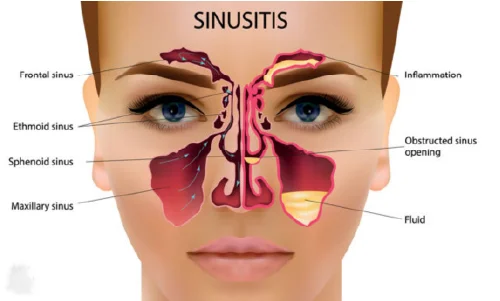Sinusitis, a common condition characterised by sinus inflammation, often requires treatment to alleviate symptoms such as facial pain and congestion. Effective management can prevent complications like sinus infections and meningitis. If you're considering treatment for sinusitis, reach out to us, or book a direct appointment with our ENT specialists. At the CK Birla Hospital, we are dedicated to ensuring that your sinusitis treatment is as safe, comfortable, and effective as possible. We're here to guide you every step of the way towards a successful recovery.

Sinusitis can be triggered by a variety of pathogens such as viruses, bacteria, fungi, and allergens. Common culprits for sinusitis include:
Certain individuals are at a higher risk of developing sinusitis due to specific factors:
Sinusitis, if untreated, poses various risks and complications, such as:
The various types of sinusitis are:
Acute, Subacute, Chronic, and Recurrent Sinusitis
Bacterial and Viral Sinusitis
Fungal Sinusitis – More severe, particularly in those with weakened immune systems.
Viral infections are the main cause of sinusitis instances, which may resolve on their own. Your symptoms might be eased by over-the-counter (OTC) medications and home remedies, like:
Nasal Congestion
Pain Medications – OTC options like acetaminophen and ibuprofen help with sinus headaches.
Antibiotics
Doctor’s Visit
Surgery
Various methods can be employed to lower the likelihood of developing sinus infections, contingent on the underlying cause. These methods include:
The sinus is a system of hollow cavities in the skull that produce mucus, helping to filter, moisten, and warm the air we breathe, and providing resonance for speech.
Sinus issues like infections or inflammation can cause discomfort but are typically not dangerous. However, severe or chronic conditions may require medical attention for proper management and relief.
The cost of a sinusitis treatment varies as per the specific type advised by a healthcare provider, such as:
The cost can also vary widely depending on several factors, including the location, the type of treatment, the doctor’s experience, and the hospital’s pricing structure.
To get an explicit estimate for the cost of sinusitis treatment at the CK Birla Hospital, contact the hospital directly. Additionally, you can consult with our board-certified ENT specialist to discuss your specific needs and receive a personalised quote for the treatment.
To get lasting relief from chronic sinusitis, you can adopt a healthy lifestyle along with medications or treatments such as surgery (functional endoscopic sinus surgery, or FESS) by consulting an ENT specialist.
If you want immediate sinus relief, you can try home remedies, such as steam inhalation and saline nasal sprays, and stay hydrated throughout the day, as this thins mucus and promotes drainage.
Yes, sinus inflammation or infections can lead to headaches due to pressure buildup in the sinus cavities. This pressure can cause pain around the forehead, eyes, cheeks, and nose.